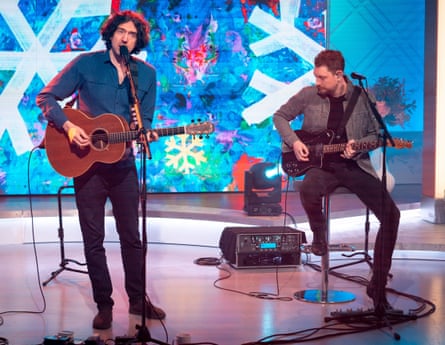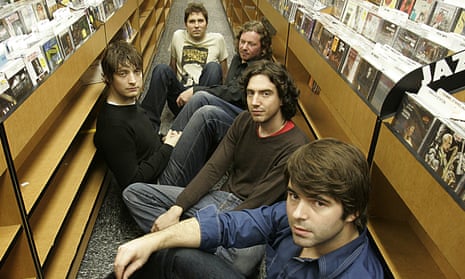Gary Lightbody, singer-songwriter
I grew up in Bangor in Northern Ireland and didn’t understand the Troubles when I was younger. I just wanted to get away. Then I saw Nirvana live and my brain exploded. I couldn’t think of anything else. I went to Dundee University with one goal: to start a band. I met a guy from Belfast – Mark McClelland – on the day I arrived and we started Shrug, who evolved into Snow Patrol.
I’m lucky that people didn’t have camera phones in those days, because I was a liability. Screaming, swearing, smashing up instruments – I was completely off the rails. One night after a 72-hour bender I fell down a flight of concrete stairs in a club in Glasgow. [Drummer] Jonny Quinn found me and thought I was dead. He said I was laid out like one of those police chalk lines that they have for dead bodies. I woke up in hospital, couldn’t see out of one eye and I had lots of teeth missing.
I went home to recover, and my parents were ashamed of me, coming home in such a state, but after that songs started pouring out. I wrote Run when I got back to Glasgow. It’s a song about protecting my family and I guess I was looking into the future, thinking about the family I would have and a saner, more stable life. My housemates were having a full-on party upstairs and I was writing down below. I was halfway through writing the song when the electricity went off because we hadn’t paid the meter. This inspired the “Light up, light up…” hook line, the first time I’d written a big chorus.
Of all the songs I’ve written, Run is the one I’m most proud of, because of how and where it was written and what people have told me it means to them. And it brought about some of what I was writing about – a new life and a financial stability.
Run came out on the Final Straw album in August 2003, and for the rest of the year we were still playing small venues and scraping by. Then Jo Whiley played all six minutes of Run on daytime Radio 1, and everything changed. We did a hasty radio edit and released it as a single. We were told it had charted, so about 30 of us gathered in my mate’s house to listen to the Top 40 rundown. Each time there was a song mentioned and it wasn’t ours we all cheered, because we knew it must have gone in higher. When they announced it had gone in at No 5 the place just erupted. It was one of the best parties we ever had.
Nathan Connolly, guitarist
I’d been talking about becoming a rock star since I was 11. In 2001, I was in a Belfast postpunk rock band called F.U.E.L. who supported Snow Patrol on an early Irish tour. I started hanging out with them and after F.U.E.L.’s drummer quit and the band’s future looked uncertain, Snow Patrol asked me to join them. They’d just been let go by [indie label] Jeepster after a couple of albums but had new management and were gigging. They picked me up in a van outside my parents’ house and I moved to Glasgow that same night.
Run was one of the songs on a CD they gave me to learn, the same demo that convinced Polydor – who then signed us – to come up to the rehearsal room to hear us.

I remember thinking Run was a special song, way before we knew what would happen to it. Most of the structural elements were on the demo, but it was much more indie then and shied away from the big chorus. [Producer] Jacknife Lee saw the potential and instilled in us the idea that if it’s a great hook, play it when it really matters. When we recorded it, he let the anthemic side shine through.
You can never put a finger on why a song connects. I remember a conversation about whether Run should be the next single, and 21-year-old me was arguing that it was way too long, which seems ridiculous now. Our final show of 2003 was in the White Horse in High Wycombe, which later featured in a TV programme called Britain’s Toughest Pubs. After Run came out, we were in Shepherds Bush Empire. The album took off and the venues just kept getting bigger.
Snow Patrol’s album Reworked is out now on Polydor. The band tour the UK until 5 December.

Comments (…)
Sign in or create your Guardian account to join the discussion